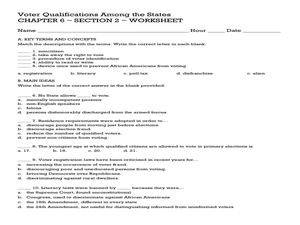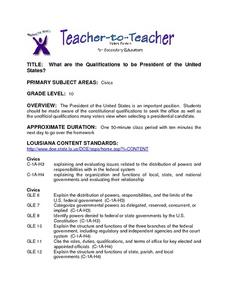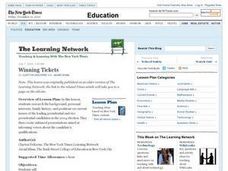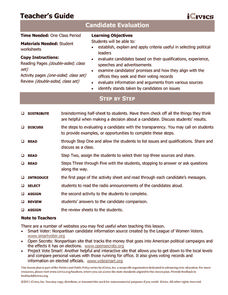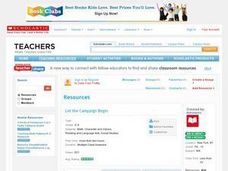Carolina K-12
Preventing Voter Fraud or Encouraging Voter Suppression?
The issues of voter fraud and voter suppression are relevant in every election, local as well as national. Soon-to-be voters learn about a recent bill proposed in North Carolina, the Voter Information and Verification Act, and decide for...
Center for Civic Education
Lesson 3: Becoming a Voter
Who is eligible to vote in your state? Class members examine their states' voting qualifications, complete sample voter registration forms, and chart the elections scheduled.
Curated OER
Growing Voters and Election 2004: Get Out the Vote
Students examine the voting process, the reasons citizens should vote, and participate in a community drive to sign up new voters. After looking at websites, students create a poster that outlines the reasons to vote, participate in a...
Curated OER
Voter Qualifications Among the States
Twelfth graders research the voting qualifications for each state. In this American Government lesson, 12th graders complete a worksheet on the main ideas they have researched.
Curated OER
What are the Qualifications to be President of the United States?
High schoolers research the qualifications necessary to be the president of the United States. They create a want-ad for this position using what they have learned about the qualifications.
Curated OER
Winning Tickets
Students research background, personal interests, family history, and positions on current issues of the leading presidential and vice presidential candidates. They create unbiased presentations aimed at informing voters about...
Curated OER
Campaign Trailblazers
Explore the backgrounds, qualifications, and platforms of the presidential candidates for the 2000 election. Though the lesson is outdated, the activities within the informational text could be good practice for your young learners as...
iCivics
Candidate Evaluation
How can we decide between candidates on election day? After contemplating various issues and qualities, your learners will go through a step-by-step process of researching and evaluating sample candidates and determining their...
Carolina K-12
How Do I Pre-Register and Vote in North Carolina?
This practical activity helps young citizens learn about pre-registration to vote in elections, discuss the merits and flaws of the pre-registration process, and register themselves. The concluding activity has young voters creating an...
Heritage Foundation
Voting and the Constitution
How difficult was it for everyone to get voting rights? Understanding voting rights and the fight to get them for everyone in the United States can be tricky for some learners. However, they are clarified after engaging in the...
Curated OER
The Voter
Young scholars identify the constitutional amendments and major federal laws that have shaped suffrage in the United States.
National Endowment for the Humanities
The 1828 Campaign of Andrew Jackson and the Growth of Party Politics
High schoolers analyze changes in voter participation and regional power, and review archival campaign documents reflecting the dawn of politics as we know it during the critical years from 1824 to 1832. Students utilize worksheets and...
Curated OER
The Issues-Substance not Style
Students continue to develop criteria for evaluating candidates, consider personal qualities needed in the presidency, and compare candidate's qualifications for office. They write in their journals: "What issues get the most air time or...
Curated OER
The Debates
Young scholars brainstorm a list of information that voters should know about candidates. In groups, they research their side of an argument in preperation for a debate. After observing media coverage, they compare and contrast the...
Curated OER
Let the Campaign Begin
Students examine the many steps involved in the electoral process. They examine past president's campaigns and write an announcement speech for the candidate of their choice.
Curated OER
The Constitution and the Right to Vote: Ch 6
The US Constitution dictates which members of society have the right to vote. After reading about amendments extending voting rights, your class answers these questions on the 15th, 14th, and 23rd amendments. Use as a quiz or to guide...
National Endowment for the Humanities
The 1828 Campaign of Andrew Jackson: Expansion of the Voting Base
Students give examples to indicate how the franchise was extended and limited in the first half of the 19th century, and cite some differences in the newly enfranchised population that could affect the way they would vote.
Classroom Law Project
How do we hire a President?
What are the job requirements for the office of president of the United States? What attributes should a candidate possess? Are the qualities needed to govern the same as those needed to win? What can an analysis of the management style...
National Endowment for the Humanities
The 1828 Campaign of Andrew Jackson: Changes in Voting Participation
Students give examples to indicate how voting participation changed in the first half of the 19th century, and make connections between changes in voting participation and the results of the election of 1828.
Curated OER
Reconstruction (1865–1877)
In this online interactive history worksheet, students respond to 7 short answer and essay questions about the causes and effects of Reconstruction following the American Civil War.
3C Skills Collaborative
Skill Twenty: Sell Successfully
"Selling is important in all professions because it involves synthesizing information and persuading people." Rather than using this as a lesson on how to sell a product, this resource might best be used as an inquiry into what goes into...
National Endowment for the Humanities
The 1828 Campaign of Andrew Jackson: Territorial Expansion and the Shift of Power
Young scholars make connections between changes in voting participation and the election of 1828, and describe regional factors evidenced by the voting results of the election of 1828.
Curated OER
The Election
Students participate in an election. They are asked to vote for one of four candidates without knowing who they are or what they stand for. Students gain an important lesson plan when voting to make sure that security of freedom and...
Curated OER
Let the Campaign Begin
Learners differentiate between positive and negative personal attributes and select a fictional character for nomination who personifies the qualities of a good leader. They use the Internet to learn about the election process and write...





